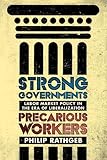Strong Governments, Precarious Workers : Labor Market Policy in the Era of Liberalization / Philip Rathgeb.
Material type: TextPublisher: Ithaca, NY : Cornell University Press, [2018]Copyright date: ©2018Description: 1 online resource (234 p.) : 15 chartsContent type:
TextPublisher: Ithaca, NY : Cornell University Press, [2018]Copyright date: ©2018Description: 1 online resource (234 p.) : 15 chartsContent type: - 9781501730597
- Labor unions -- Austria
- Labor unions -- Denmark
- Labor unions -- Sweden
- Manpower policy -- Austria
- Manpower policy -- Denmark
- Manpower policy -- Sweden
- Precarious employment -- Austria
- Precarious employment -- Denmark
- Precarious employment -- Sweden
- General Economics
- Labor History
- Legal History & Studies
- POLITICAL SCIENCE / Labor & Industrial Relations
- precarious workers, welfare state, labor markets, trade unions, government, inequality, political economy, comparative political economy, industrial relations, public policy, capitalism, Europe, organized labor, Austria, Denmark, Sweden
- social democracy, welfare universalism
- 331.25/727 23
- HD5858.A9
- online - DeGruyter
| Item type | Current library | Call number | URL | Status | Notes | Barcode | |
|---|---|---|---|---|---|---|---|
 eBook
eBook
|
Biblioteca "Angelicum" Pont. Univ. S.Tommaso d'Aquino Nuvola online | online - DeGruyter (Browse shelf(Opens below)) | Online access | Not for loan (Accesso limitato) | Accesso per gli utenti autorizzati / Access for authorized users | (dgr)9781501730597 |
Frontmatter -- Contents -- Preface -- Acknowledgments -- Abbreviations -- 1. The Protection of Outsiders in the Era of Liberalization -- 2. Labor Market Policy in Austria, Denmark, and Sweden -- 3. Relying on the Weak: Austrian Unions and Smoothed Dualization -- 4. Strengthened Governments and the Erosion of Danish Flexicurity -- 5. Goodbye to Swedish Social Democracy and Universal Welfare -- 6. Strong Governments and Precarious Workers in the Era of Liberalization -- Notes -- Bibliography -- Index
restricted access online access with authorization star
http://purl.org/coar/access_right/c_16ec
Why do some European welfare states protect unemployed and inadequately employed workers ("outsiders") from economic uncertainty better than others? Philip Rathgeb’s study of labor market policy change in three somewhat-similar small states—Austria, Denmark, and Sweden—explores this fundamental question. He does so by examining the distribution of power between trade unions and political parties, attempting to bridge these two lines of research—trade unions and party politics—that, with few exceptions, have advanced without a mutual exchange.Inclusive trade unions have high political stakes in the protection of outsiders, because they incorporate workers at risk of unemployment into their representational outlook. Yet, the impact of union preferences has declined over time, with a shift in the balance of class power from labor to capital across the Western world. National governments have accordingly prioritized flexibility for employers over the social protection of outsiders. As a result, organized labor can only protect outsiders when governments are reliant on union consent for successful consensus mobilization. When governments have a united majority of seats, on the other hand, they are strong enough to exclude unions. Strong Governments, Precarious Workers calls into question the electoral responsiveness of national governments—and thus political parties—to the social needs of an increasingly numerous group of precarious workers. In the end, Rathgeb concludes that the weaker the government, the stronger the capacity of organized labor to enhance the social protection of precarious workers.
Mode of access: Internet via World Wide Web.
In English.
Description based on online resource; title from PDF title page (publisher's Web site, viewed 26. Apr 2024)


